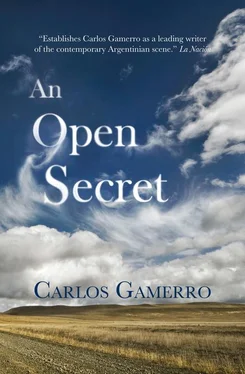“WHAT HAPPENED? What exactly happened?” I kept asking the table, which Batata Sacamata had joined now that Don León had stumped off in his enthusiasm to outline his proposal to the Neighbourhood Committee.
“There are several versions,” Licho started again.
“I’m fed up of versions,” I insisted. “Did they kill her or didn’t they?”
Guido, who hadn’t said anything until then, intervened.
“Yes Fefe. Greco killed her, or had her killed.”
“How can you be so sure?” objected Batata Sacamata. “You there were you?”
“Come on,” insisted Guido. “The whole town knows it was Greco. He didn’t dare to do it here, so he waited till she moved to Rosario.”
“The whole town knows, the whole town knows. You all think you know everything around here. Want to know the truth? Nobody had the faintest what was going on inside. A what do you call it a bunker the headquarters always was. Another world. Like it was in a different town,” Sacamata insisted. I ignore him.
“How did he do it?” I ask my friend.
“Don’t know, obviously nobody’s going to admit it, but everybody knows that people from here in town went to Greco and asked him to sort out the problem with Delia. ’Specially after the statue episode. And Greco told them, you get her to move to Rosario and don’t worry about the rest, I’ll take care of it, he told them.”
“So how did they do it?”
“In her younger days before she got married she used to have a boyfriend in the military, who must’ve risen to say colonel by then. They persuaded her to go and look him up and talk to him. Mamá told me, ’cause she bumped into Delia who’d got her hopes up again with the idea, all dressed up and made up she was and couldn’t stop talking about her boyfriend and how he’d kept on calling her and writing to her and just by announcing herself she’d sort out the problem over Darío in a jiffy, that was the word she used, a jiffy. What a fool she’d been to waste her time in this little town, talking to ignorant storekeepers and policemen. They’d be bound to treat her properly in Rosario. She left in her car, a beige Renault 12, that very afternoon. No one knows if she made it to Rosario. She was never heard of again. Or her car. Just once, years later by that time, one of her brothers Eduardo showed up, who lives in Villa María in Córdoba. He came about the inheritance, to pick up some papers that were still here, and about the house.”
“Which house is it?” I asked.
“You don’t know? That beautiful one facing the square. The mansion with a huge front garden and the slate façade.”
“Oh I know the one, sure”—I finally made the connection and then, “Did he end up with it?”
The question was addressed to everyone, but once again it was Guido who replied.
“The house? No, Greco did. He sold it after the flood. Old Widower Gius lives there now, he owns land south of the lagoon. If you want to see it we can go, he’s a really nice old guy.”
PREDICTABLY ENOUGH, by dinner time of the day I’d spent with Auntie Porota and Auntie Chesi, after a shower that hadn’t helped to revive me, I found myself with aching bones and joints, a sore throat when I swallowed the Tuttolomondos’ pasta— Dafratti Number Thirty-Eight —which tasted of putty with flour-paste sauce and chopped plastic, and an infinite weariness that called to mind my eminently forgettable exploits of four years ago. Leticia gave me a cup of tea with aspirin, and when my fever rose to thirty-nine she called Dr Alexander, who diagnosed flu, prescribed antibiotics which I’d refuse to take, and set out his theory about the terrorist attack on the Colonel’s statue to his captive audience of one. (“A woman could never have done it on her own. Physically impossible. During the traditional festivities it took at least eight strong men to blah blah … That woman had outside help. It’s easy to guess who from. Her son’s partners in crime, who were plotting vengeance on our town …”). The following day, after getting my return ticket changed yet again — I’d lost count of the number of times — and calling home to let them know, Guido and Leticia moved me to Celia’s, as they’d be out all day and wouldn’t be able to look after me, and besides they’d want to go back to fucking in peace by now, they must have forgotten what it was like. I must have spent a couple of days in a constant stupor streaked with apathetic nightmares, through which stalked listless demons repeating I mean nobody any harm and I don’t mean to be unkind and let’s call a spade a spade. I awoke, or rather opened my eyes again to the world around me — which to the alarm of my fevered brain turned out to be the bedroom I slept in as a boy at my grandmother’s, hardly any different — with Celia stroking my matted hair and the inexplicably compassionate gaze of her big dark eyes over her sad, crumpled smile. She arranges the pillows for me so I can sit up a little.
“Do you know?” I ask her, and seeing her nod, “How long?”
“Always Fefe,” she answers. “I was very fond of your Mamá, and she told me … everything, I think. Ever since you arrived I wondered how long you could go without saying anything. You can’t stand it anymore can you Fefe.”
She’s right. I shake my head, incapable of speech, incapable of holding back the tears spilling from my eyes.
THE CLEARLY ABORIGINAL NAME ‘Malihuel’ has always had overtones of mystery and beauty in a region where all other towns bear Creole or foreign names, as if Malihuel had been the only one to emerge out of the land, rather than be imposed upon it from above. And yet the precise origin and even potential significance of this place name have given rise to the most wide-ranging disputes and conjectures without — so far — the veil of the mystery having been lifted […]
The oldest documentary reference to the place name ‘Malihuel’ comes in a concession of land belonging to Gerónimo Luis Cabrera and occupied by the Choncancharagua tribe, running “inland across the Pampas as far as Malihuel” and “thence from Malihuel ten leagues north to India Vieja” […]
The thesis regarding the Araucano origins of the toponym has been supported by most authors to have studied the topic, albeit with differing interpretations of the details.
a) Some have adopted the view attributed to Félix de Azara, for whom MALIHUEL may mean ‘Malin’s place’, from the suffix ‘hue’, meaning a place or region, and ‘Mali’ or ‘Malin’, the name of a supposed chief who may in the remote past have established his village hereabouts […]
b) Another Araucanist thesis suggests that the first element of the word might have been ‘Meli’, or ‘four’, the ‘e’ of which may have switched to an ‘a’—by no means a repellent idea; the precise pronunciation of the ‘a’ in Araucano may have had a sound intermediate between the two vowels, as it can have in other languages, such as English. From this have emerged explanations that place the geographical above the historical: Melinhuinkul, or ‘four hillocks’; Melico, or ‘four watering holes’; and even Melicohue, ‘four lagoons’. ( 1 ) The four hillocks incidentally, are conspicuous by their absence from the surrounding area; and, even in the most extreme of droughts, there is no record that the one lagoon has ever broken into four.
c) In my search for a word that, by corruption in its assimilation into the phonetics of Castilian, has lead to the elusive word ‘Mali’, I came across one in the dictionary of J M de Rosas (2 )that did not figure in most of the dictionaries I had previously consulted: namely, the word ‘Malin’, which properly means ‘stone’, ‘pebble’ or ‘flint’; esp. cutting-or sharp-edged, such as an arrowhead, say. Hence MALINHUE, meaning a ‘place or region of flint’, from which MALIHUEL may have derived for obvious phonetic reasons. […]
Читать дальше












